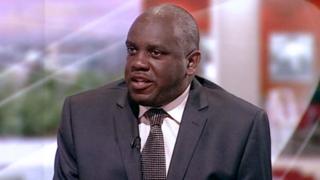
The government has named Tony Sewell as chair of its new commission looking into race disparity in the UK.
The formation of the body was announced in June by Boris Johnson in wake of anti-racism protests following the death of George Floyd.
It will look at all aspects of inequality, including criminal justice, education, employment and health.
Mr Sewell said the commission would "seek to inform a national conversation about race, led by the evidence".
Now the boss of education charity Generating Genius, Mr Sewell worked with the PM in 2013 when he was Mayor of London, leading his education inquiry into the capital's schools.
The prime minister said Mr Sewell shared his "commitment to maximising opportunity for all".
The commission will report back directly to Mr Johnson with its findings by the end of the year.
As well leading a charity, Mr Sewell has been a board member for both the Science Museum and the Youth Justice Board.
He is also a columnist, author and fellow at University College London, and sat on the Windrush working group.
He is a longstanding commentator on racial issues and education, attracting criticism from some quarters for his views, such as claiming boys were being failed by schools because lessons had become too "feminised".
He also said an anti-intellectual Afro-Caribbean youth culture was one of the reasons girls performed better than boys in school.
The BBC's community affairs correspondent, Rianna Croxford, reported he was understood to be in line for the role earlier on Thursday.
After the appointment was confirmed, Mr Sewell said: "I have spent my entire career in education striving to help all students achieve their full potential.
"I know however that inequality exists, and I am committed to working with my fellow commissioners to understand why."
Commissioner needs community support
Analysis by BBC political correspondent Leila Nathoo
This commission had its sceptics from the moment it was announced.
Some opposition MPs and organisations working on race equality were uneasy about Boris Johnson's comments that he wanted to "change the narrative" on race and "stop a sense of victimisation and discrimination".
There was also concern one of the prime minister's closest aides, Munira Mirza, who's been overseeing the setting up of the commission, had previously questioned whether structural racism existed.
Tony Sewell, who's now been chosen as chair, has written in support of both of these views.
As Downing Street was working to recruit the commission's members, I understand that a number of prominent figures in the black community - who did not want to be identified publicly - sought to distance themselves from the process.
Sources said some who'd been reluctant to pursue discussions with the government regarded the commission as "toxic" and a way for ministers to "play for time" or "pay lip service" to the idea of race equality.
A government spokesperson dismissed the suggestion a number of black individuals had rejected the opportunity to be part of the commission.
But the choice of chair is sure to be a controversial one - one source has already described the decision as a "disaster".
The question is what the commission can achieve if it doesn't have the support of the very communities it is supposed to be working to help.
The commission will face high levels of scrutiny after accusations another government review into race is a distraction from the issue.
Ahead of the appointment, the Coalition of Race Equality Organisations (CORE) - which brings together a number of groups working in the field - warned the chair and commissioners "must be representative and secure widespread support from BAME communities and involve people who are prepared to analyse and challenge systemic racism".
The other members confirmed for the commission are:
- Dr Maggie Aderin-Pocock - scientist and co-presenter of BBC's The Sky at Night
- Keith Fraser - chair of the Youth Justice Board for England and Wales
- Dr Samir Shah - CEO of Juniper TV, former BBC journalist and former chair ofThe Runnymede Trust
- Lord Ajay Kakkar - Professor of Surgery at University College London
- Dr Dambisa Moyo - international economist and author
- Martyn Oliver - CEO of Outwood Grange Academies Trust
- Naureen Khalid - co-founder of online national school governor forum UkGovChat
- Aftab Chughtai - co-founder of the campaign group Muslims for Britain, member of the Grenfell Tower Taskforce and chair of West Midlands Police Independent Advisory Group
- Mercy Muroki - senior policy researcher and columnist.
After the announcement of the membership, the PM said: "The commission will be inclusive, undertaking research and inviting submissions where necessary. It will set a positive agenda for change."